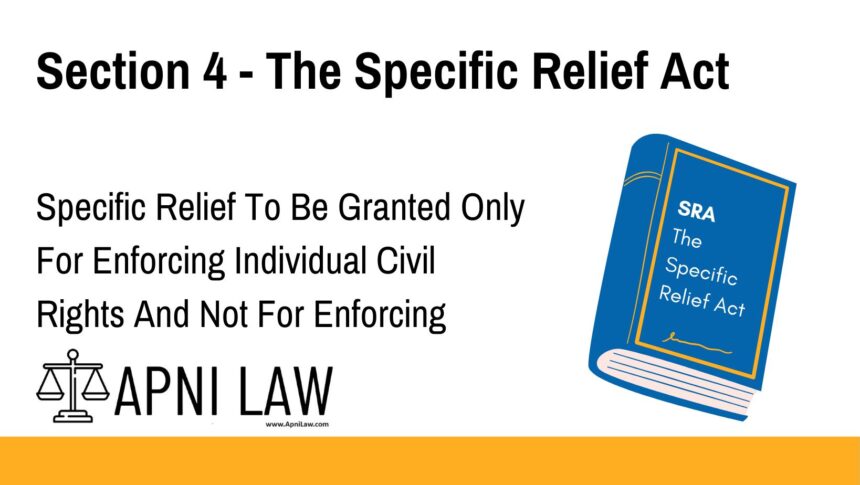Code: Section 4 of The Specific Relief Act, 1963
Specific relief can be granted only for the purpose of enforcing individual civil rights and not for the mere purpose of enforcing a penal law.
Explanation of Section 4 of the Specific Relief Act
Section 4 outlines the purpose and scope of specific relief. It clarifies that specific relief is intended solely for the enforcement of private civil rights, not for the punishment of criminal or penal offences.
This section acts as a guiding principle for interpreting the rest of the Act. The remedies available under this law—such as specific performance, injunctions, rectification, and cancellation—are only meant to protect or restore a person’s civil rights, such as rights arising from contracts, trusts, or property interests.
Key Points:
- Specific relief is not a substitute for criminal prosecution.
- The Act applies where an individual’s private legal rights are infringed.
- It cannot be used to punish someone for violating public laws or penal statutes.
Illustration
Example 1: Enforcing a Civil Right
If a person agrees to sell a plot of land but refuses to complete the transaction, the buyer may seek specific performance. This is an example of enforcing a private civil right through specific relief.
Example 2: Attempting to Enforce Penal Law
Suppose a person files a suit under this Act demanding that another be punished for cheating. This would not be allowed under Section 4, because penal consequences must be dealt with under criminal law, not through the Specific Relief Act.
Common Questions and Answers
- What type of rights can be enforced under the Specific Relief Act?
Only individual civil rights, such as contractual or property rights, can be enforced. - Can this Act be used to impose criminal penalties?
No. Section 4 clearly states that the Act cannot be used for the purpose of enforcing penal law. - Does this section limit the relief a court can grant?
Yes. It ensures that the court uses the remedies in this Act only to uphold civil rights and not for any criminal or punitive objectives.
Conclusion
Section 4 of the Specific Relief Act, 1963 sets the tone for the entire legislation. It ensures that the remedies provided are limited to enforcing civil rights and are not misapplied for penal enforcement. This distinction helps maintain the separation between civil and criminal legal remedies.
To learn more about your civil rights and legal remedies under Indian law, visit ApniLaw.








